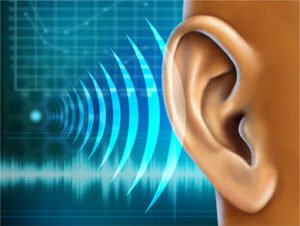Hearing Evaluations
At any age, hearing loss can cause major disruption to a person’s life. Babies and young children have an especially difficult time.
Hearing loss has multiple causes, including:
- Allergies (serous otitis media)
- Fluid in the middle ear
- Poor eustachian tube function
- Ear infection (otitis media)
- Perforated eardrum
- Benign tumors

These disorders cause conductive hearing loss, a condition where sound waves are unable to effectively reach the inner ear.
In some cases, hearing loss may be caused by a sensorineural dysfunction that affects the inner ear, auditory nerve and brain. This hearing loss involves delicate structures of the head and brain that are not easily treated.
A hearing evaluation (test) is the first step in determining the presence and severity of hearing loss in babies, children, and adults.
Hearing Evaluation vs. Hearing Screening
A hearing evaluation is intended to discover the type of hearing loss and the causes.
A hearing screening is used to determine if there is hearing loss.
A typical hearing evaluation will involve a series of examinations and tests to determine the state of the ear structures and what may be causing hearing loss. The tests vary for babies, children, and adults.
For newborns, tests include the automated otoacoustic emissions (AOAE) test and the automated auditory brainstem response (AABR) test.
For older babies and children, tests include: visual reinforcement audiometry, play audiometry, pure tone audiometry, bone conduction test, speech perception test, and tympanometry.
Adults will receive any of these tests.
What to expect during a hearing evaluation
When you come in, or bring your baby or child, these are the steps to expect:
- The doctor will perform a hearing screening test. This is a simple test to determine whether there is hearing loss.
- If the results indicate a loss, the doctor will then perform a thorough examination of the ear structures. This will determine if any obvious factors are causing the loss. Your doctor will need specific information like how long the issue has persisted, if it has been getting worse, etc.
- The doctor will then schedule a number of hearing evaluation tests. These tests will target various parts of the ear to determine where the problem is located.
- After getting the hearing evaluation results, the doctor will advise you on the best treatment plan.
Hearing evaluations involve a diverse set of tests but all these are harmless and are safe for babies, children and adults alike.
If you are diagnosed with hearing loss, you will discuss treatment with your doctor. This treatment could be medical or surgical, based on test results. If you need a hearing aid, the doctor will also advise you.
Contact our office:
To find out more about our Hearing Evaluation service, visit Dr. Schneiderman’s office located at 215 Union Avenue – Suite C, Bridgewater, NJ 08807, or book an appointment by calling us at (908) 725-5050.

